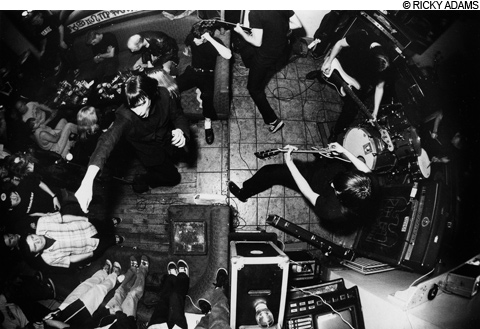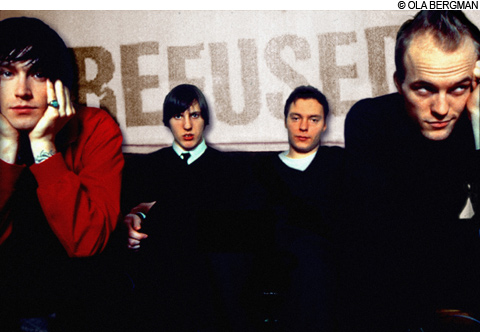
IN TRUTH Refused weren't the first band to mix rock and roll with 12-point plans and far-left politics,
but The Shape of Punk To Come remains a landmark effort. |
Songs may exist for our entertainment, but bands often thrive not just as music makers but as exemplars of behavior. The way that group of three to five troglodytes-with-guitars-and-drums behaves as a functioning unit — with internal politics and external policies of engagement — often means more to the faithful than the sound coming out of the speakers. But it is indeed rare when a band's managerial style, as it were, lines up with the passion of their music, allowing their tunes to soar with the added heft of social purpose. In the mid '90s, five young men from Umeå, Sweden, created a hardcore unit that burned with insouciant fury, each tune a manifesto railing against an old system that the band refused to buy into. The aptly named Refused bowed out in 1999, with a final communiqué posted on their Web site that referenced four deconstructionist philosophers in its first sentence. Their re-emergence this year, debuting at Coachella, was at once an acquiescence to the faithful and perhaps a demonstration that, in the end, they were less a group of principled workers and more a group of five guys who enjoyed playing music to ecstatic fans. One question remains: should we care?
In the liner notes to The First Conspiracy, the debut record by vocalist Dennis Lyxzén's first post-Refused band, the (International) Noise Conspiracy, Lyxzén writes that he wanted his new act to "combat music's function as spectacle." It's a notion borrowed with acknowledgement from early-20th-century French Marxist Guy Debord, but it's also perhaps an acknowledgement that "spectacle" in many ways defines what made Refused so ripping. And not just the dramatic exit strategy that they pulled: the music of Refused was grand and pummeling, melding the heaviness of metal, the insistence of hardcore, and the skronk of post-punk into a heaving, bloody mess. But throughout their career, much attention was put upon the manifesto-laden diatribes that filled the band's lyric sheets. They weren't the first band to mix rock and roll with 12-point plans and far-left politics — only a few years before Refused's formation, DC's Nation of Ulysses were espousing death to capitalism whilst rocking out in three-piece suits. But whereas Nation of Ulysses seemed like an elaborate ruse, Lyxzén and Refused seemed painfully earnest, effortlessly proselytizing via their increasingly sophisticated metal-tinged musical assault with a scream that was anything but a put-on.
 |
The tipping point was "New Noise," the fulcrum at the center of the band's ambitious final 1998 album The Shape of Punk To Come. That song, in a sense, realized the ambitions of the group, making '90s rock sound lame by comparison and slyly commenting on the struggle of being agit-prop within an agit-prop song. "Great words won't cover ugly actions" Lyxzén screams, which perhaps explains the pains the band went through in crafting Shape to beautify their attack, stirring in jazz and drum-and-bass and prog and techno so as to pretty up the malformed hardcore scree that had been their audio calling card. It was a band stretching past their comfort zone, and on the verge of a messy split. In the ensuing decade-plus, one guitarist went through an opera academy, the other became a medical doctor, and all of them grew up and out of the early-20s angst that fomented the band's initial insurrections.